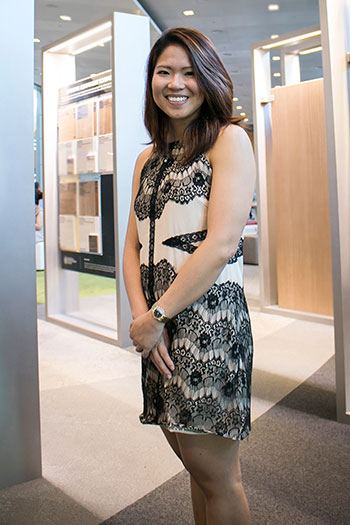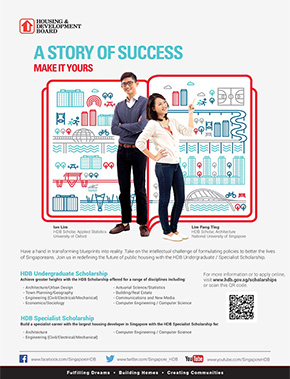HDB was established in 1960 with the aim of providing clean and affordable housing to residents who lived in unsanitary slums and overcrowded squatter settlements dotting Singapore. By 1965, HDB built 54,000 flats, furnishing our pioneer generation of Singaporeans with quality accommodation and laying the groundwork for the city-state’s next stage of development.
Today, more than five decades later, HDB has built more than a million flats in 23 towns and three estates across the island. Housing over 80% of Singapore’s resident population, HDB flats have enabled generations of Singaporeans to live and grow in active and vibrant communities.
Beyond building homes, HDB also strives to improve lives and create a sustainable living environment through research and innovation. We speak to HDB Overseas Undergraduate Scholar Quek Xin Ping, on how she contributes to building a better Singapore in her role as a Researcher.
What sparked your interest in pursuing a scholarship and career with HDB?
Quek Xin Ping: I have always had a desire to pursue a line of work that would have an impact on people, but I was not sure where I wanted to work. I attended several scholarship fairs and spoke to various people before deciding that the work at HDB was congruent with my personal values and aspirations. What appealed to me most about HDB was the diverse nature of the work, and the opportunity to be involved in shaping housing policies to meet the changing expectations of our residents.
What do you find meaningful about your current role in HDB?
Xin Ping: As a Researcher, much of my work revolves around obtaining feedback from residents in order to inform future town and policy planning. My department works with other HDB departments to understand residents’ needs, and learn more about the issues they face. Our work includes collecting, analysing and monitoring the levels of satisfaction on various aspects of public housing. The data is then used to inform the future planning of HDB neighbourhoods, and create a better living environment conducive for building cohesive communities.
What I find most fulfilling about my role as a Researcher is the engagement with HDB residents and the opportunity to gain valuable insights from their feedback. I believe that the planning of our HDB towns cannot be divorced from an apt understanding and evaluation of the needs of our residents.
How does HDB support your professional and personal development?
Xin Ping: During my university days, HDB gave me the flexibility to pursue a diversity of modules, which provided me with the opportunity to expose myself to various fields of study. It was also supportive of my application to pursue a master’s degree in the US, after completing my undergraduate studies in the UK. The opportunity to study Social Policy in two vastly different countries provided me with a better appreciation of how policies are shaped under different contexts.
Furthermore, while I was in the US, I was also given the opportunity to travel to India to take a course on community action and empowerment - which HDB fully sponsored. I learnt how local rural communities, despite their poor living conditions, organised themselves to support and empower each other financially and emotionally. Through these processes, the community members fostered strong bonds with one another. The experience was tremendously valuable, and gave me insights on the possibilities to encourage a healthy and inclusive environment within HDB communities.

Quek Xin Ping
HDB Overseas Undergraduate Scholar
Researcher
What unique opportunities or developments can fresh graduates look forward to in the organisation?
Xin Ping: HDB is a very large organisation with various groups that work on different aspects of housing. The work here is never mundane or stagnant. We are constantly faced with new challenges that we have to find creative solutions to.
Fresh graduates can look forward to experiencing the different aspects of HDB work through project teams or committees and opportunities for job rotation. This allows them to gain a clearer picture about how these different functions come together to make up a whole.
What qualities should HDB scholars possess?
Xin Ping: Most importantly, HDB scholars should believe that their work here is truly meaningful. We are, a public service organisation after all, and our primary role should always be to serve the needs of our residents. Ensuring that our own values and beliefs are aligned with that of the organisation motivates us in our work.
Scholars should also dare to challenge the status quo. The demands of our work are constantly changing. We need to dare to change, and to question the way things are being done so that we can strive to provide better solutions and continuously innovate. I personally feel that having such a mindset would propel HDB to be a better and more effective organisation as a whole.
What would you say to potential HDB scholars?
Xin Ping: I would encourage those who are thinking of applying for the HDB Scholarship to constantly keep abreast of social issues in Singapore. Housing is so intricately linked with other aspects of our lives, which together make up our identities. To fully appreciate the work we do would involve understanding the context within which people live and how decisions are made. All in all, be passionate about making a difference to the heartlands and communities that matter to us. Join us in shaping the future of public housing in Singapore.

